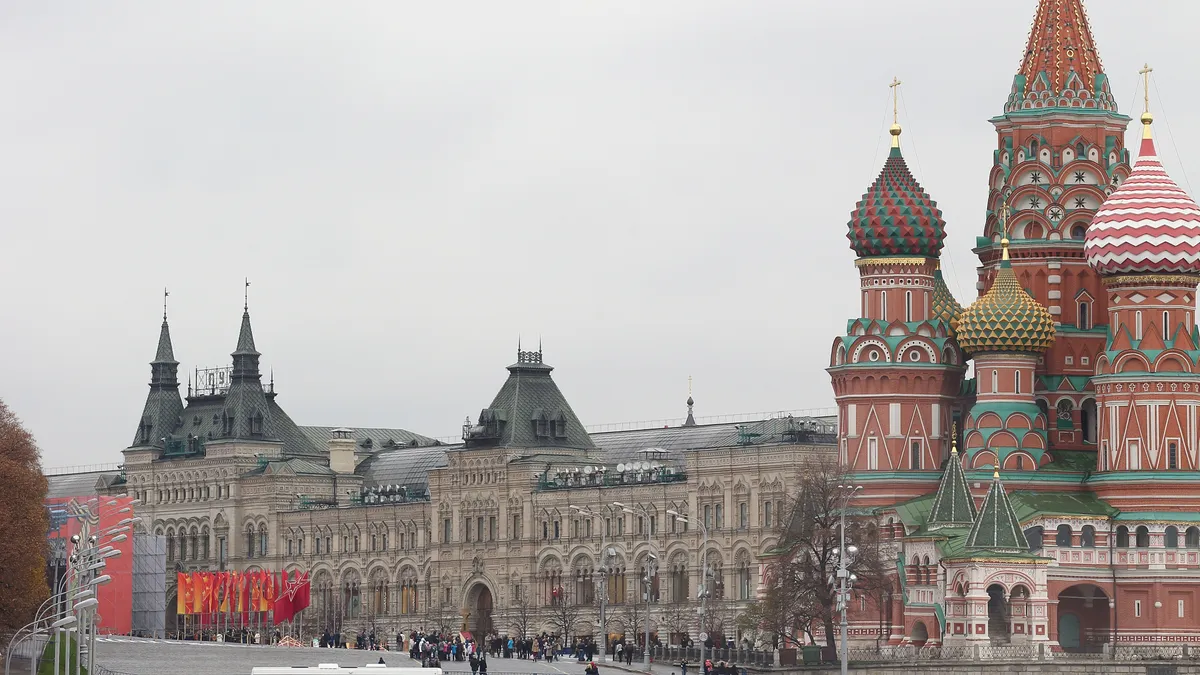U.S. card companies' losses in Russia are likely to mean gains for the Kremlin-backed Mir payment system and cards tied to it, according to a recent web post from the London-based data and analytics company GlobalData.
U.S. card companies, including Visa and Mastercard, shut down their operations in Russia after the U.S. and other countries imposed sanctions last month on Russia because of its invasion of neighboring Ukraine. That left an opening for the domestic Mir payment system operated by Russia's central bank and the Mir-branded cards issued by financial institutions.
“This situation will benefit local card schemes as banks are likely to migrate from international schemes to ‘Mir’ cards, the local scheme,” GlobalData's lead banking and payments analyst, Ravi Sharma, said in the March 30 post. The Mir network "accounted for around 27% of Russian card transaction shares by value in 2021 and is expected to rise further.”
Overall, Russia's use of cards generally rose between 2017 and 2020 and were expected to have risen last year as well, but the GlobalData report predicts use will now decline as the Russian economy contracts and inflation rises, reducing consumer spending.
The Institute for International Finance is forecasting a 15% contraction in Russian gross domestic product compared with the 3% growth previously expected, the GlobalData post said. As a result, card payments are expected to fall by 4.8% this year, the research firm predicted.
“While the sanctions and the resulting exit of international card schemes and banks will impact the Russian card payments market, this in turn will create new opportunity for Mir cards and domestic banks to expand their market presence, as consumers are likely to switch to local players for uninterrupted access to banking and card payment services," Sharma said in the post.
Visa, Mastercard, and PayPal will miss out on a combined $2.4 billion in revenue in the wake of their exit from Russia and Ukraine, according to another web post from GlobalData on April 1.
Last year, Visa generated about $964 million in revenue from Russia and $241 million in Ukraine, which accounted for 4% and 1% percent, respectively, according to GlobalData. The San Francisco-based card giant had $24.1 billion in revenue last year. Mastercard generated about $755 million from Russia and $378 million from Ukraine in 2021, roughly 4% and 2%, respectively, GlobalData said. That was based on the Purchase, New York-based company’s $18.9 billion in revenue last year.
The U.S. card companies disclosed those figures in early March after beginning to suspend services in Russia due to the international sanctions.
San Francisco-based PayPal had previously shut down Russian domestic services in 2020, but suspended its remaining cross-border services last month. That included blocking the e-wallets of Russian clients, according to GlobalData. PayPal earned 0.5 percent of its 2021 revenue, about $127 million, from Russia and Ukraine, GlobalData said. PayPal’s 2021 revenue was $24.5 billion.
Before the invasion, Discover was in the process of registering as a foreign payment system operator with the Russian Central bank and establishing a branch office in the country, but the Riverwoods, Illinois-based company last month suspended those plans to enter the Russian market. Discover also suspended acceptance of Discover cards issued by all Russian banks that run on the Discover Global Network and targeted banks in Belarus, a close ally of Russian President Vladimir Putin.
“Cards issued by Russian banks on these networks will now not work outside Russia,” GlobalData Banking Analyst Murthy Grandhi said in the web post on U.S. losses "However, consumers can still use the cards for making payments within the country until their expiration, as the domestic payments in Russia are processed through the domestic National Payment Card System. To offset these sanctions, the Central Bank of Russia intends to issue co-badged payment cards connecting China’s UnionPay and Russia’s Mir systems.”
The Treasury Department’s Office of Foreign Assets Control imposed sanctions on Russia’s two largest banks in February. Russia also was kicked out of the Society for Worldwide Interbank Financial Telecommunication (SWIFT), a messaging network of banks that makes cross-border transactions easier.











